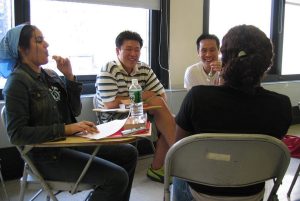
I have been teaching writing at the college level for over six years to both first and second language learners. Unless I am teaching EAP, where my students are second language learners, my classes have been mixed: native language students at various language levels and experiences as well as non-native language learners, including 1.5 generation (people who immigrate to a new country before or during their early teens) with different levels of language proficiency. Note that no matter who the students are, my job is to help my students achieve the learning outcomes of the course (e.g. to be able to write an academic essay), which means I must pay attention and therefore take into consideration each student’s individual needs. How do I reconcile all these differences in a writing course? Well, among many teaching strategies, I focus on selective attention.
Selective Attention
According to Richard Schmidt (2010) our ability to focus is dependent on our awareness of the existence of stimuli. It is difficult (even impossible) to pay attention to every bit of information around us, so we need to be consciously aware it exists to be able to notice it. Hence, not knowing what to focus our attention on can leave us paying attention to unimportant information, unaware of what it is we should be focusing on! Continue reading






